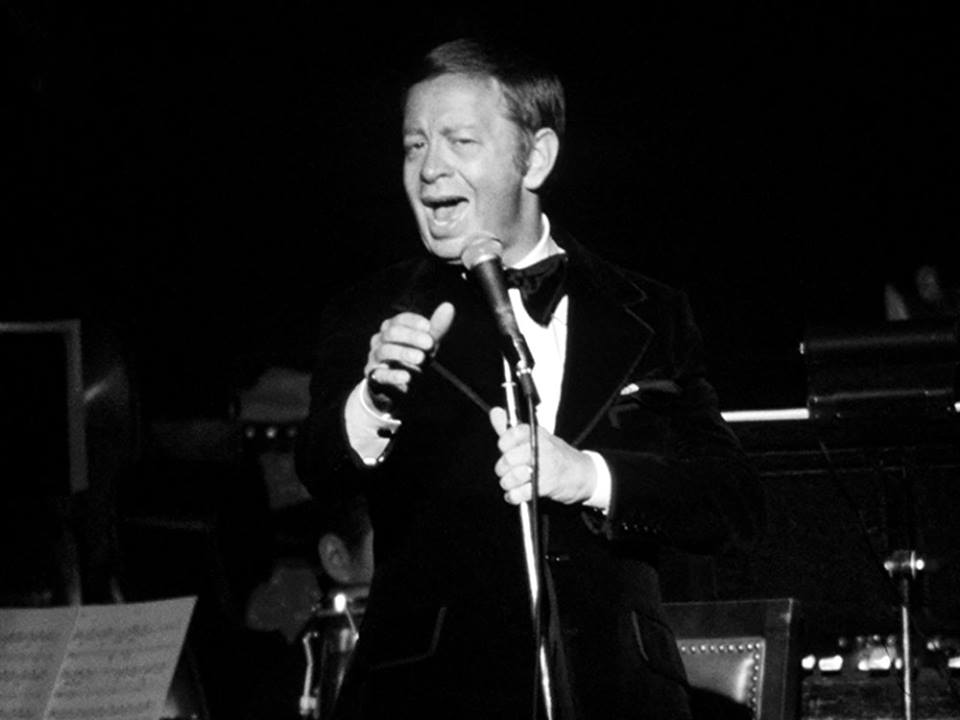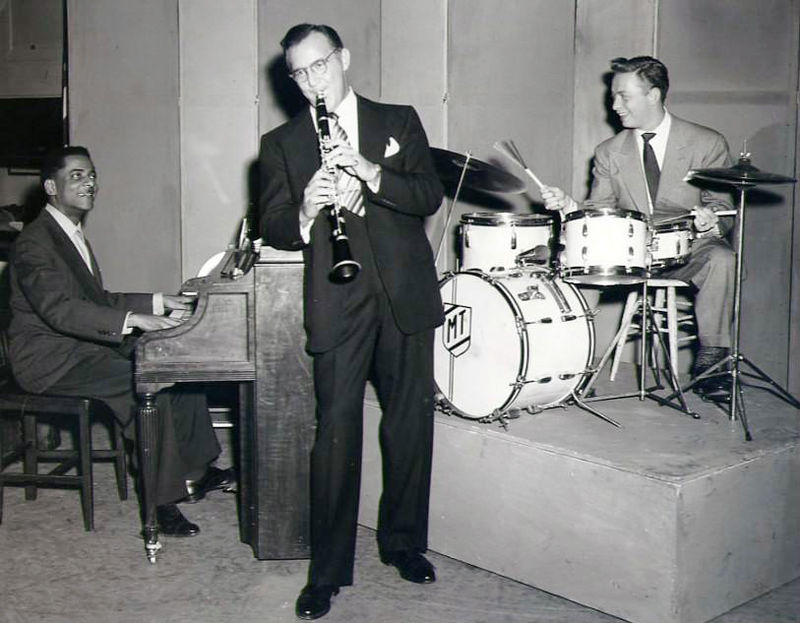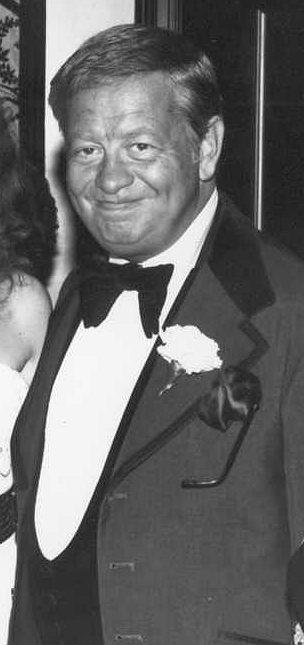BIOGRAPHICAL DETAILS
Full Name: Melvin Howard Torme
Description: Vocalist, Drummer, Actor, USA
Known For: The writer of “Lament to Love” recorded by the late Harry James.
Instruments: Drums, Voice
Music Styles: Jazz, Easy listening
Location: United States of America
Date Born: 13th September 1925
Location Born: Chicago, Illinois, United States of America
Date Died: 5th June 1999
Location Died: Los Angeles, California, United States of America
Photo Comments: Photo by Allan Light – used with permission.
CONTACT DETAILS
Web Site:
YOUTUBE VIDEO
BIOGRAPHICAL PROFILE
Mel Torme
An American musician, known for his jazz singing. He was also a jazz composer and arranger, drummer, pianist, and actor in radio, film, and television, and the author of five books. He composed the music for the classic holiday song “The Christmas Song” (“Chestnuts Roasting on an Open Fire”) and co-wrote the lyrics with Bob Wells.
Melvin Howard Tormé was born in Chicago, Illinois, to immigrant Russian Jewish parents, whose surname had been Torma. However, the name was changed at Ellis Island to “Torme.” A child prodigy, he first sang professionally at age 4 with the Coon-Sanders Orchestra, singing “You’re Driving Me Crazy” at Chicago’s Blackhawk restaurant.
Between 1933 and 1941, he acted in the network radio serials The Romance of Helen Trent and Jack Armstrong, the All-American Boy. He wrote his first song at 13, and three years later, his first published song, “Lament to Love,” became a hit recording for Harry James. He played drums in Chicago’s Shakespeare Elementary School drum and bugle corps in his early teens. While a teenager, he sang, arranged, and played drums in a band led by Chico Marx of the Marx Brothers. His formal education ended in 1944 with his graduation from Chicago’s Hyde Park High School.
In 1943, Tormé made his movie debut in Frank Sinatra’s first film, the musical Higher and Higher. He went on to sing and act in many films and television episodes throughout his career, even hosting his own television show in 1951–52. His appearance in the 1947 film musical Good News made him a teen idol for several years.
In 1944 he formed the vocal quintet “Mel Tormé and His Mel-Tones,” modeled on Frank Sinatra and The Pied Pipers. The Mel-Tones, which included Les Baxter and Ginny O’Connor, had several hits fronting Artie Shaw’s band and on their own, including Cole Porter’s “What Is This Thing Called Love?” The Mel-Tones were among the first jazz-influenced vocal groups, blazing a path later followed by The Hi-Lo’s, The Four Freshmen, and The Manhattan Transfer.
Later in 1947, Tormé went solo. His singing at New York’s Copacabana led a local disc jockey, Fred Robbins, to give him the nickname “The Velvet Fog,” thinking to honor his high tenor and smooth vocal style, but Tormé detested the nickname. (He self-deprecatingly referred to it as “this Velvet Frog voice”.
As a solo singer, he recorded several romantic hits for Decca (1945), and with the Artie Shaw Orchestra on the Musicraft label (1946–48). In 1949, he moved to Capitol Records, where his first record, “Careless Hands,” became his only number one hit. His versions of “Again” and “Blue Moon” became signature tunes. His composition “California Suite,” prompted by Gordon Jenkins’ “Manhattan Tower,” became Capitol’s first 12-inch LP album. Around this time, he helped pioneer cool jazz.
In his 1994 book “My Singing Teachers,” Torme cited Patty Andrews, lead singer of The Andrews Sisters, the most successful show business act of the 1940s (second only to Bing Crosby), as one of his favorite vocalists, saying, “They had more hit records to their credit than you could count, and one of the main reasons for their popularity was Patty Andrews. She stood in the middle of her sisters, planted her feet apart, and belted out solos as well as singing the lead parts with zest and confidence.
Above: Mel Tormé on drums performing with Benny Goodman and Teddy Wilson.
The kind of singing she did cannot be taught, it can’t be studied in books, it can’t be written down. Long experience as a singer and wide-open ears were her only teachers, and she learned her lessons well.”
From 1955 to 1957, Tormé recorded seven jazz vocal albums for Red Clyde’s Bethlehem Records, all with groups led by Marty Paich, most notably Mel Tormé with the Marty Paich Dektette. When rock and roll music (which Tormé called “three-chord manure”) came on the scene in the 1950s, commercial success became elusive. During the next two decades, Tormé often recorded mediocre arrangements of the pop tunes of the day, never staying long with any particular label. He was sometimes forced to make his living by singing in obscure clubs.
He had two minor hits, his 1956 recording of “Mountain Greenery,” which did better in the United Kingdom where it reached No. 4 in May that year; and his 1962 R&B song “Comin’ Home, Baby,” arranged by Claus Ogerman. The latter recording led the jazz and gospel singer Ethel Waters to say that “Tormé is the only white man who sings with the soul of a black man.” It was later covered instrumentally by Quincy Jones and Kai Winding.
In 1960, he appeared with Don Dubbins in the episode “The Junket” in NBC’s short-lived crime drama Dan Raven, starring Skip Homeier and set on the Sunset Strip of West Hollywood. He also had a significant role in a cross-cultural western entitled Walk Like a Dragon starring Jack Lord.
Tormé played ‘The Deacon’, a bible-quoting gunfighter who worked as an enforcer for a lady saloon-owner and teaches a young Chinese, played by James Shigeta, the art of the fast draw. In one scene, he tells a soon-to-be victim: ‘Say your prayers, brother Masters. You’re a corpse.’ And then delivers on the promise. Tormé, like Sammy Davis Jr. and Robert Fuller was a real-life fast-draw expert. He also sang the title song.
In 1963–64, Tormé wrote songs and musical arrangements for The Judy Garland Show, where he made three guest appearances. However, he and Garland had a serious falling out, and he was fired from the series, which was canceled by CBS not long afterward.
A few years later, after Garland’s death, his time with her show became the subject of his first book, “The Other Side of the Rainbow with Judy Garland on the Dawn Patrol” (1970). Although the book was praised, some felt it painted an unflattering picture of Judy, and that Tormé had perhaps over-inflated his own contributions to the program; it led to an unsuccessful lawsuit by Garland’s family.
Tormé befriended Buddy Rich, the day Rich left the Marine Corps in 1942. Rich became the subject of Tormé’s book Traps — The Drum Wonder: The Life of Buddy Rich (1987). Tormé also owned and played a drum set that drummer Gene Krupa used for many years. George Spink, treasurer of the Jazz Institute of Chicago from 1978 to 1981, recalled that Tormé played this drum set at the 1979 Chicago Jazz Festival with Benny Goodman on the classic “Sing, Sing, Sing.”
Tormé had a deep appreciation for classical music; especially that of Frederick Delius and Percy Grainger.
Later career and death.
The resurgence of vocal jazz in the 1970s resulted in another artistically fertile period for Tormé, whose live performances during the 1960s and 1970s fueled a growing reputation as a jazz singer. He found himself performing as often as 200 times a year around the globe.
In 1976, he won an Edison Award (the Dutch equivalent of the Grammy) for best male singer, and a Down Beat award for best male jazz singer. For several years around this time, his September appearances at Michael’s Pub on the Upper East Side would unofficially open New York’s fall cabaret season. Tormé viewed his 1977 Carnegie Hall concert with George Shearing and Gerry Mulligan as a turning point. Shearing later said:
On August 8, 1996, a stroke abruptly ended his 65-year singing career. In February 1999, Tormé was awarded the Grammy Lifetime Achievement Award. Another stroke in 1999 ended his life.
Torme is buried at the Westwood Village Memorial Park cemetery in Los Angeles. In his eulogistic essay, John Andrews wrote about Tormé.
The songwriterTormé wrote more than 250 songs, several of which became jazz standards. He also often wrote the arrangements for the songs he sang. He often collaborated with Bob Wells, and the best known Tormé-Wells song is “The Christmas Song,” often referred to by its opening line “Chestnuts roasting on an open fire.” The song was recorded first by Nat King Cole. Tormé said that he wrote the music to the song in only 45 minutes, and that it was not one of his personal favorites, calling it, somewhat dismissively, “my annuity”.
Live albums
1955 Mel Tormé at the Crescendo
1957 Mel Tormé at the Crescendo
Songs for Any Taste
1962 Mel Tormé at the Red Hill
1975 Mel Tormé live at the Maisonette
1981 Mel Tormé and Friends
1982 Encore At Marty’s
The Classic Concert Live (with George Shearing and Gerry Mulligan)
An Evening with George Shearing & Mel Tormé (with George Shearing)
1983 An Evening at Charlie’s (with George Shearing)
1987 A Vintage Year (with George Shearing)
1988 Mel Tormé and the Marty Paich Dektette – In Concert Tokyo (with Marty Paich and his Dek-Tette)
1990 Night at the Concord Pavilion
Mel and George “Do” World War II (with George Shearing)
Mel Tormé Live at the Fujitsu–Concord Festival 1990
1992 Sing Sing Sing
1993 The Great American Songbook: Live at Michael’s Pub
1996 An Evening with Mel Tormé
2002 Mel Tormé Live at the Playboy Jazz Festival (Recorded 1993)
Studio albums
1954 Musical Sounds Are the Best Sounds
1955 It’s a Blue World
1956 Mel Tormé and the Marty Paich Dek-Tette (with Marty Paich and his Dek-Tette)
Mel Tormé Sings Fred Astaire (with Marty Paich and his Dek-Tette)
1957 Mel Tormé’s California Suite (with Marty Paich and his Dek-Tette)
Tormé Meets the British
1958 Prelude to a Kiss
Mel Tormé Sings About Love
Tormé
1959 ¡Olé Tormé!: Mel Tormé Goes South of the Border with Billy May
Back in Town (with the Mel-Tones)
1960 Mel Tormé Swings Shubert Alley (with Marty Paich and his Dek-Tette)
Swingin’ On the Moon
Broadway, Right Now! (with Margaret Whiting)
I Dig the Duke! I Dig the Count!
1961 My Kind of Music
1962 Comin’ Home Baby!
1963 Mel Tormé Sings Sunday in New York & Other Songs About New York
1965 That’s All
1966 Right Now!
1968 A Day in the Life of Bonnie and Clyde
1969 A Time for Us (Love Theme from Romeo & Juliet)
Raindrops Keep Fallin’ on My Head
1977 Tormé: A New Album
1978 Together Again: For the First Time (with Buddy Rich and his big band)
1983 Top Drawer (with George Shearing)
1985 An Elegant Evening (with George Shearing)
1986 Mel Tormé, Rob McConnell and the Boss Brass (with Rob McConnell and the Boss Brass)
1988 Mel Tormé and the Marty Paich Dektette – Reunion (with Marty Paich and his Dek-Tette)
1992 Nothing Without You (with Cleo Laine)
Christmas Songs
1994 A Tribute to Bing Crosby
1995 Velvet & Brass (with Rob McConnell and the Boss Brass)
Films include.
Higher and Higher (1943)
Ghost Catchers (1944)
Pardon My Rhythm (1944)
Resisting Enemy Interrogation (1944)
Let’s Go Steady (1945)
Junior Miss (1945)
The Crimson Canary (1945)
Janie Gets Married (1946)
Good News (1947)
Words and Music (1948)
Duchess of Idaho (1950)
The Fearmakers (1958)
The Big Operator (1959)
Girls Town (1959)
Walk Like a Dragon (1960)
The Private Lives of Adam and Eve (1960)
The Patsy (1964) (Cameo)
A Man Called Adam (1966)
Land of No Return (1978)
Artie Shaw: Time Is All You’ve Got (1985)
The Night of the Living Duck (1988)
Daffy Duck’s Quackbusters (1988)
The Naked Gun 2½: The Smell of Fear (1991)
Television workThe Mel Tormé Show (1951–1952)
TV’s Top Tunes (host in 1951)
Faye Emerson’s Wonderful Town (1 episode, 1952)
Summertime U.S.A. (1953) (Summer replacement series)
The Nat King Cole Show (July 9, 1957)
The Comedian (1957) (live drama written by Rod Serling and directed by John Frankenheimer)
The Pat Boone Chevy Showroom (January 7, 1960)
To Tell the Truth (panelist, 1964)
The Lucy Show as Mel Tinker (3 episodes, 1965–1967)
The Sammy Davis Jr. Show (March 11, 1966)
Run for Your Life, with Ben Gazzarra (episode writer)
You Don’t Say! (guest, 1967)
The Virginian (special guest 1968)
It Was a Very Good Year (1971) (Summer replacement series)
Pray TV (1982) (Cameo)
Hotel (1983) (pilot for series) (Cameo)
Night Court (guest appearances 1986–1992)
A Spinal Tap Reunion: The 25th Anniversary London Sell-Out (1992)
Pops Goes the Fourth (1995)
Seinfeld — episode “The Jimmy” (1995)
Sliders — episode “Greatfellas” (1996)
External links:
- Biography and discography from vh1.com
- Biography and discography from theiceberg.com
- Fuller Up Obituary
- Mark Evanier on Tormé and “The Christmas Song”
- 1976 interview with Tormé
- Mel Tormé at the Internet Movie Database
- Smooth As Velvet The Mel Torme Discography
- “Mel Tormé and the Marty Paich Dek-tette” by Thomas Cunniffe (Jazz.com)
- Radio interview with Steve March Torme WSLR
From Wikipedia, the free encyclopedia



